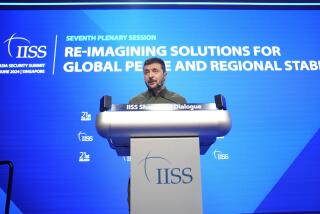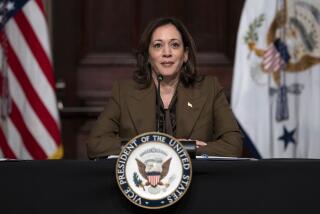May Boycott Shultz : Arabs’ Stance Points Up Deep Distrust of U.S.
- Share via
JERUSALEM — The threatened Palestinian boycott of a proposed meeting with Secretary of State George P. Shultz during the American official’s planned Middle East peace shuttle later this week has underlined a deep-seated Arab distrust of U.S. policy and added to doubts about any hoped-for breakthrough in the peace process.
Shultz wants to meet this Friday with Palestinians from the Israeli-occupied West Bank and Gaza Strip, where 11 weeks of unrest have resulted in at least 61 dead and the explosive return of the Palestinian issue into the international headlines.
Instead of reveling in what may appear as the first important chance to translate their success on the streets into more permanent political gains, however, the Palestinians are threatening to boycott Shultz unless he agrees to unprecedented ground rules for a meeting scheduled by the Palestine Liberation Organization.
PLO Demands Confirmed
Palestinian leaders confirmed the PLO demands here Tuesday and pledged that no West Bank or Gaza Strip personality would meet with Shultz without PLO approval.
Diplomatic sources, meanwhile, suggested that the American side is also digging in and threatening to cast the Palestinians into the role of peace process spoilers unless they back down from the PLO demands and agree to a meeting.
U.S. special envoy Wat T. Cluverius, who last weekend confirmed Shultz’s desire for a meeting in talks with 10 local Palestinians, reportedly warned the group that “the train of the peace process has started, and whoever fails to get on board will be the loser.”
And another diplomatic source who spoke on condition of anonymity said in an interview Tuesday that “whoever says ‘no’ first will take the responsibility for seeing the whole (Shultz initiative) fall apart.”
Warnings Dismissed
While some Palestinians here are clearly worried that they may wind up being blamed for any failure of the Shultz plan, others say they have heard similar American statements in the past. And the latter dismiss the warnings as a ploy intended to help impose a “Pax Americana” that falls far short of Palestinian goals.
The prevailing view of a U.S. Middle East policy held hostage to Israeli interests is so strong among Arabs here that some even claim the entire Shultz peace shuttle is structured purposely so that the Palestinians will emerge as the bad guys, thus helping to repair the damage Israel has suffered to its worldwide image since the unrest began in early December.
“Everyone is fed up with American policy,” said Ziad abu Zayed, a prominent Palestinian editor from East Jerusalem and one of those whose names have been mentioned as possible interlocutors for Shultz. “We feel we have paid a very expensive price, and as a result we think we should get something substantial.”
Motives Questioned
“Palestinians question Shultz’s good will,” added another East Jerusalem source who requested anonymity. “If he had such good will, he would have tried to solve our problem before (more than) 60 Palestinians died.”
The PLO is opposed to any meeting with Shultz that does not include representatives of the approximately 3 million Palestinians living outside Israel and the occupied territories.
On Tuesday, Hanna Siniora, editor of the East Jerusalem-based, pro-PLO daily Al Fajr and the man reportedly designated by the PLO as its go-between for the Shultz mission, reportedly told American officials that a delegation of Palestinians from the territories and from outside were ready to meet the U.S. official in some Arab or Western capital.
The demand is meant “to symbolize that we are one people and that the matter does not only concern the fate of the Palestinians” under Israeli rule, Siniora told newsmen.
Committed to Israel
The PLO has reportedly made it clear that while it insists on approving any delegates to a Shultz meeting, those representatives do not have to be PLO members. The United States is committed to Israel not to meet with PLO members until the organization renounces terrorism and officially recognizes Israel’s right to exist.
On the other hand, the PLO leadership is under pressure here from the young militants at the forefront of the 11 weeks of unrest in the territories. The so-called Unified National Leadership for the Uprising in the Occupied Territories, which has increasingly tried to guide what began as a truly spontaneous anti-Israeli protest, is reportedly opposed overwhelmingly to a meeting with Shultz under any conditions.
“Shultz is basing his plan on the old realities,” said one young Palestinian militant from Bethlehem. “But now we have new realities because of the uprising. Palestinians have shown that they have possibilities of confronting the Israelis and making the occupation costly. They don’t need the outside Arab world to force the Palestinian problem to be addressed.”
These Palestinian militants see the Shultz shuttle as intended primarily to calm the situation in the territories without making--or forcing Israel to make--any significant concession to the residents.
Some see Shultz’s probable failure here as a vital precondition for the convening of a U.N.-sponsored international peace conference, at which they believe the Palestinians will be able to make much greater gains than under an American-brokered arrangement.
More to Read
Sign up for Essential California
The most important California stories and recommendations in your inbox every morning.
You may occasionally receive promotional content from the Los Angeles Times.













